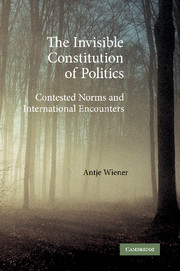Book contents
9 - Incorporating access to contestation
Published online by Cambridge University Press: 22 September 2009
Summary
As the result of two hundred years of constitution-making and remaking and of discussions of rival and changing theories of democratic-constitutional justice, we have a better understanding of how the two principles of legitimation work together in this open-ended and non-definitive manner. Democratic constitutionalism is an activity rather than an end-state.
(Tully 2002a: 209; my emphasis)Introduction
As social constructs, norms are contested by default. They evolve through interaction in context and are hence considered as evolving and flexible except for limited periods of normative stability; however, if their importance ‘lies not in being true or false but in being shared’ (Katzenstein 1993: 268; my emphasis), then the sense of appreciation of norms is likely to change according to time and place. This normative flexibility needs to be accounted for both conceptually and empirically. The research project presented in this book turned to examining the role of fundamental norms in world politics based on such a bifocal approach, i.e. engaging the interrelation between empirical and normative research. Three issues matter in this regard. Firstly, an empirically observable reaction suggests the existence of a norm. Secondly, an empirically observable and analytically expected reaction to an appropriate norm can be established. Thirdly, the conditions for normative legitimacy in the absence of both a constitutionally (no shared formal validity) and socially (no social recognition) limited modern context of governance need to be defined.
- Type
- Chapter
- Information
- The Invisible Constitution of PoliticsContested Norms and International Encounters, pp. 197 - 214Publisher: Cambridge University PressPrint publication year: 2008



